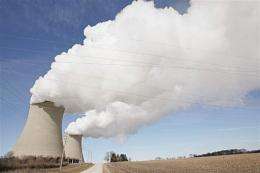US won't speed up emissions cuts

Domestic politics will not allow the United States to deepen it commitment for cutting carbon pollution over the next decade despite growing international pressure, Washington's top climate negotiator said Sunday.
"We are jumping as high as the political system will tolerate," Todd Stern said, rejecting China's call this week for rich nations to slash greenhouse gases by 40 percent before 2020, compared to 1990 levels.
"The 40 percent the Chinese have talked about is not realistic," the US Special Envoy for Climate Change told AFP on the eve of a two-day climate meeting, beginning Monday, of ministers from the world's most powerful economies.
A summit of Major Economies Forum on Energy and Climate (MEF) members -- which together account for 80 percent of global CO2 emissions -- is scheduled for July in Italy, probably on the heels of a G8 summit there, Stern said.
US President Barack Obama has proposed reducing greenhouse gas emissions by 14 percent by 2020, compared to their 2005 level, roughly equivalent to a three percent cut off the 1990 benchmark. He has also called for an 80 percent cut by 2050.
Climate legislation wending its way through US Congress would meet both these goals, and perhaps more, if unchanged.
But in the run up to UN talks in Copenhagen in December charged with delivering a new global climate deal, developing countries such as China and India have said that this is not enough.
Their position has been echoed by many climate experts as well as the European Union, which has committed to a 20 percent reduction by 2020, 30 percent of others follow suit.
"It is clear that the United States is going to have to do more," France's environment minister, Jean-Louis Borloo, told journalists ahead of the MEF meeting.
Stern, however, cautioned that pushing for deeper cuts in the United States could backfire.
"We completely agree it is vital that developed countries get a path that is ambitious and consistent with what science is telling us to do," he told AFP in an interview.
"But perfect is the enemy of good -- you can insist on that, say you really need to have it, and you can end up with nothing."
Even in rejecting China's position, though, Stern said Beijing and Washington had opened a wide range of bilateral channels on climate change.
US House of Representatives Speaker Nancy Pelosi arrived in China on Sunday, and is scheduled to join Senate Foreign Relations Committee chairman John Kerry at a clean energy forum in Beijing later in the week.
Several top Obama administration officials, including Secretary of State Hillary Clinton, have also beat a path to China with climate issues high on the agenda. Treasury Secretary Timothy Geithner is set to go in June.
Stern himself will take part in a three-day "interagency" trip next month, when he will meet with his Chinese counterpart Xie Zhenhua and other officials.
"We mean to have very in-depth conversations with respect to climate change per se, and our hope and intention of developing a very, very robust, high-octane clean energy partnership with the Chinese," he said.
Doing so, he added, was critical for the UN process: "It is extremely important that the US and China be working together -- and be seen working together. That is absolutely pivotal for Copenhagen."
The MEF meetings -- initiated by Obama -- group the G8 nations, emerging economies China, India, Brazil, Mexico and South Africa, along with Indonesia, South Korea and Australia.
The Paris gathering -- the second this year -- will also include the European Union, a representative from the United Nations, and Denmark, which will host the UN negotiations at year's end.
(c) 2009 AFP















